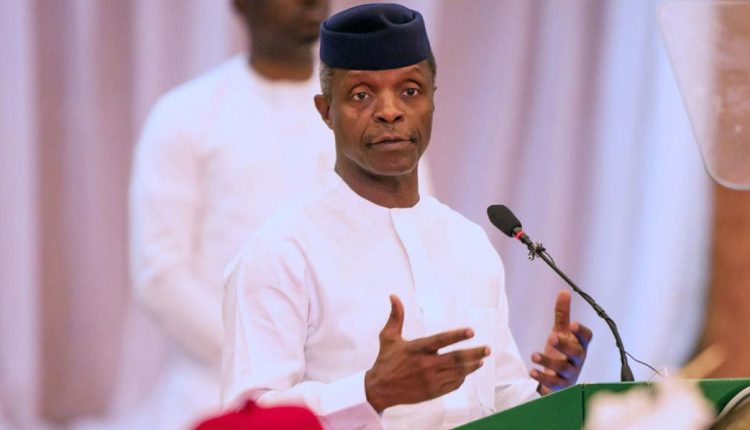BREAKING: Osinbajo: Africa Faces Worst Debt Crisis in 80 Years, with Rising Insecurity

Former Vice-President Yemi Osinbajo, on Monday, in Freetown, Sierra Leone, said Africa is in the throes of the worst debt crisis in 80 years, stressing that the economic distress was accompanied by an alarming surge in insecurity.
He said, since the COVID-19 pandemic, an estimated 55 million more Africans had slipped into poverty, with 39 million falling into extreme poverty.
According to him, youth unemployment was staggering, with up to a quarter of young Africans neither in education, employment, nor training, stressing that, simultaneously, 20 of the 39 African countries eligible for concessional borrowing were at the high risk of, or already in debt distress.
He, however, noted that elections alone do not constitute democracy, but that, “True democracy delivers dignity – food on the table, education for children, safety in our streets, and hope for the future.”
Osinbajo, who spoke as keynote speaker at a colloquium to mark the 61st birthday of President Julius Maada Bio, addressed the theme: “From Vision to Impact: The People-Centered Leadership Model.”
According to him, African leaders must adopt people-centred governance, “a development paradigm that places the needs and voices of the vast majority – particularly those at the bottom of the pyramid – at the heart of policymaking.”
This, he said, “is a call to reimagine leadership – not as the power to rule, but as the duty to serve.
Across Africa, Osinbajo said, countries were striving for structural transformation while grappling with growing poverty, unemployment, and debt.
“Since the COVID-19 pandemic, an estimated 55 million more Africans have slipped into poverty, with 39 million falling into extreme poverty. Youth unemployment is staggering, with up to a quarter of young Africans neither in education, employment, nor training.
“Simultaneously, 20 of the 39 African countries eligible for concessional borrowing are at high risk of, or already in debt distress. Africa is in the throes of the worst debt crisis in 80 years. This economic distress is accompanied by an alarming surge in insecurity,” he said.
The Sahel, Osinbajo lamented, “has become home to the world’s fastest growing and deadliest terrorist groups, accounting for nearly half of deaths from global terrorism. West Africa alone is reeling from waves of insurgencies, armed banditry, and kidnappings. Add to this the democratic backsliding we are witnessing—coup d’états in Burkina Faso, Mali, Guinea, and Niger.”
These reversals, Osinbajo argued, “threaten the democratic progress we made in the early 2000s. And disturbingly, segments of society are becoming more accepting of unconstitutional changes because they feel democracy has failed to improve their lives.
“The reality is stark: a growing number of Africans, especially young people, feel alienated, angry, and unseen. From the #EndSARS and #EndBadGovernance protests in Nigeria to the 15 Gen Z uprising in Kenya, there is a mounting frustration with governance.
“Voter turnout is declining. Extremist groups exploit the despair of the jobless. And across the continent, people question whether government exists for them at all.”
But it is not all gloom and doom, according to Osinbajo.
“The good news is that the vast majority of our people do not want military rule. In 2023, the UNDP conducted a Perception Survey of 8,000 African citizens in order to better understand how citizens felt about military coups. A key question they asked was what their preferred option for governance was.
“Most citizens said that democracy remained their preferred style of government. In fact, only 11% of the citizens in countries that had experienced unconstitutional changes of government preferred non-democratic forms of government.
“So, the issue is not democracy, it is how the political practitioners of democracy can ensure that the government of the people by the people for the people does not forget the aches and pains of the people.
“To make people-centred governance work we must move decisively from top-down elite focused strategies to bottom-up, inclusive development. But the first requirement is political will. Is government at the highest level committed to governance that ensures that the bottom of the pyramid will be the first consideration in policy and planning?
“Indeed, the distinguishing feature of states that have grown successfully and nurtured democracy is leadership that has a vision for society and that can effectively demonstrate its commitment to growth, social development and the provision of public services. So, the leadership class must reframe the national discourse and come up with a mobilising idea for society such as an ideology of democratic development.”
In his speech at the occasion attended by government officials, diplomats, civil society leaders, and politicians, President Bio highlighted his primary goals in leadership to include improving human capital development, promoting gender equality, and strengthening democratic institutions.
The colloquium, he promised, would be an annual event to provoke conversations about leadership anchored on good governance and the rule of law not only in Sierra Leone but across the African continent.
